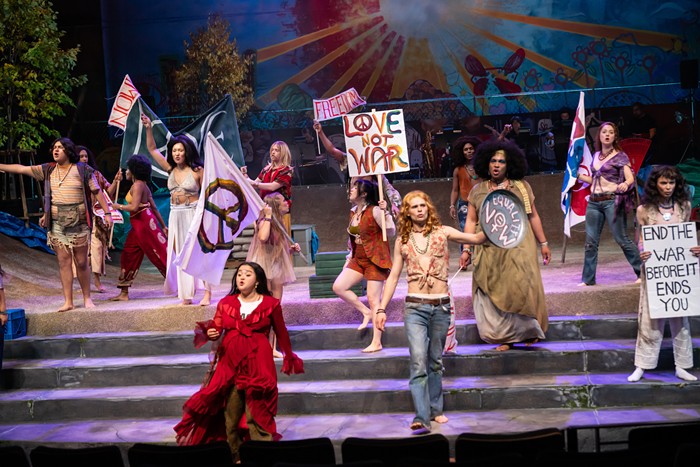FOR THE LAST 50 YEARS, critics have been struggling to explain what the hell happens in Harold Pinter's The Homecoming. I'll try anyway: Teddy, the black sheep son of a North London working-class family comes home from America to visit his father and brothers, bringing his mysterious wife, Ruth. That's the easy part. What follows—as Ruth acquaints herself with those in-laws—would be an awful lot like chaos if it weren't so tightly controlled.
Jerry Mouawad and the company at Imago Theatre play up that feeling of controlled chaos, and amplify it with searing absurdity. They make you laugh and immediately wonder if you should be laughing. A surreal emotional logic governs Pinter's play, so that afterward one feels that the world is slightly off-kilter—it's not actually chaos; in fact, it feels like you could potentially get your footing, if you could only figure out where to step.
Imago plays with that heightened emotional landscape. The production's lighting and sound design skew toward melodrama: sudden lighting changes and booming crescendos of dramatic music read like marks of climactic emotional events in mid-century talkies.
Douglas Mitchell's Max is terrifyingly on-edge. Watching Mitchell is spellbinding, not like a train-wreck as much as watching a train you know is purposefully on the wrong tracks as it barrels toward another. Teddy is the hardest nut to crack in this play, and Jeffrey Jason Gilpin plays him with an aloofness that's funny and unsettling. Meanwhile, Craig Rovere as Sam plays a personification of the phrase "meanwhile," melting quietly into various corners of the stage.
Proximity is a weapon in this production. The characters feel like naval mines come unmoored, floating around and toward each other. Often it's Anne Sorce as Ruth who seems to be the most motile of these, the one person on stage who knows exactly what she's thinking and can articulate it. Sorce is a beautiful, deliberate, and carefully subversive Ruth.
It's only as the events of the play grow more sinister and the characters all become more and more like Dickensian villains—seedy and evil in an ugly, old-fashioned way—that the energy of the play actually calms, albeit fleetingly. By the end, every strange element—the disparate acting styles, the lights and music, the seething rage and bursts of violence—feels shaken into a credible, stable whole. It'll have you trying to figure it out for the next 50 years.




















